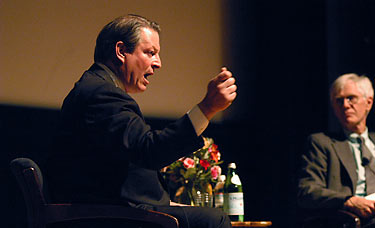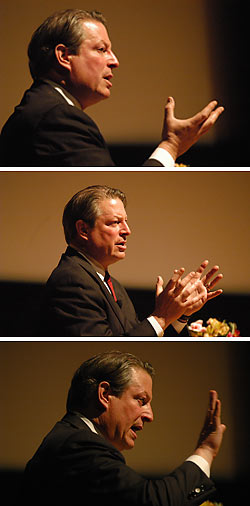UC Berkeley Web Feature
 |
Former Vice President Al Gore, joined onstage by Journalism School Dean Orville Schell, gets passionate about the threat of global warming. (Peg Skorpinski photos) |
Air Force Two behind him, Al Gore eyes the stratosphere
Former vice president visits Berkeley with a chilling message on global warming and U.S. democracy
BERKELEY – With the clock running out on the 2004 presidential campaign, Al Gore came to Berkeley on Tuesday with a message that transcended - for the most part - the national obsession with undecided voters in battleground states. Time is running out for the planet, he warned, unless we stop "disgorging this ridiculous amount of pollution into our atmosphere."
"I'm Al Gore," said the man who needed no introduction. "I used to be the next president of the United States." Instead, as fate and the Supreme Court have ordained, now-citizen Gore has his eye on the bigger picture. Employing an arsenal of whiz-bang technical slide-show effects - from breathtaking time-lapse NASA photography of Earth to a "Simpsons"-style cartoon for which, in a comic tour de force necessitated by a sound-system glitch, he supplied all the voices - Gore drew a frightening picture of a world on the brink.
"There is a climate crisis," he said. "We have to work within our political system to share the facts about what is going on, and make ethical choices about what is right and what is wrong, what we have to do and what we have to stop doing."
"I'm not sure whether to be inspired or depressed," mused Orville Schell, dean of the Graduate School of Journalism, who joined Gore onstage at Wheeler Auditorium following the hour-long presentation.
"Inspired," replied the former vice president, who nonetheless proceeded to describe an American democracy nearly as polluted as the biosphere.
 "It's nonsense to say we can't solve [global warming]. We can solve this. But we don't have a lot of time to do it." |
Gore, a bit broader than he was in the Clinton years and, by Schell's reckoning, "much more unchained," jokingly admitted that it had been difficult to adjust to civilian life. "I flew on Air Force Two for eight years," he said, feigning a pained expression, "and now I have to take off my shoes to get on an airplane."
After apologizing for his red necktie - which he hadn't realized was "a potential faux pas" - Gore confidently roamed the stage wielding a laser pointer, his left hand stuffed in his pocket, looking more professor than pol. (He refers to himself these days as "a recovering politician.") He leavened his message of impending doom with familiar flashes of humor, a stubborn optimism, and the occasional sideways dig at the current White House resident, over whom Gore sighed the sighs heard 'round the world during 2000's most memorable debate.
Gore, who wrote his environmental call to arms, Earth in the Balance, in 1992 as a U.S. senator from Tennessee, never referred to notes as he catalogued the "collision between our civilization and the earth." Massive glacial melting from the poles to the Alps to Mt. Kilimanjaro. Rising ocean temperatures and sea levels. Heat waves in Europe and India, hurricanes in Florida. The 10 hottest years in recorded history occurring in the past 13 years, the 20 hottest in the past 25. And the entire process speeding up at a pace scientists consider "astonishing."
"Global climate is a nonlinear system," warned Gore. "Change isn't gradual. It can take big jumps."
He called global warming "the defining challenge that our generation and the one to come is going to have to confront," and condemned the "denial" of those in authority - an attitude he likened to assurances that "there won't be any casualties in Iraq," or "any deficits from the tax cuts" - as "deeply, deeply unethical."
Prompted by Schell to explain the nation's failure thus far to confront the global climate crisis, Gore blamed a "loss of literacy" and a "crisis of decision-making" in America.
"Our public forum has become constricted," he said, citing the "quasi-hypnotic" effects of television and "a constant stream of disinformation financed by companies like ExxonMobil and the less responsible coal companies, very cynically aimed at confusing people about what is fact and what is fiction."
"Reading is cratering in the United States - it's like that Greenland ice cap," Gore said, bemoaning the myriad distortions of the TV age and the manipulation of the media by politicians and corporations.
Instead of the "meritocracy of ideas" that characterized U.S. democracy from the time of the Founding Fathers, Gore said, we now have a system in which "information comes mixed with propaganda."
"Aren't you describing a system that is seriously broken?" asked Schell.
"Yes," said Gore.
"And yet you are optimistic," replied Schell, a bit wondrously. Gore insisted he is.
"It's nonsense to say we can't solve this," he said, referring to global warming. "We can solve this. But we don't have a lot of time to do it."
As proof, Gore reeled off a litany of world-altering achievements, including women's suffrage, a cure for polio, advances in civil rights, the moon landing, the fall of Communism, the release of Nelson Mandela, and another environmental triumph many insisted "couldn't be done," the healing of the hole in the ozone layer - a problem Gore said "we are well on the way to solving" through international cooperation to phase out chlorofluorocarbons.
As for repairing the rifts in the fabric of U.S. democracy, Gore called on universities - and UC Berkeley in particular - to help raise the level of political discourse.
"I think our democracy is in trouble, I think our country is in trouble, I think our civilization is in trouble," Gore said. "But I'm optimistic in spite of that conclusion," he added, "because of the nature of the human spirit."
"We all have to be really determined about taking back what is precious and true that we love about the United States of America from those who are defiling the idea of America," he said. "And trust me, we can do it. And we have to do it."
Gore, fresh from two days in Florida campaigning for Democratic presidential nominee John Kerry, strove to avoid attacking President Bush directly. But he did manage to inject a dose of politics into his message of hope.
"We will find a way to prevail," he promised the partisan crowd, which bookended the evening with a pair of standing ovations. "We are due for a renaissance of good decision-making. And, in fact, I predict that it will begin next Tuesday."

